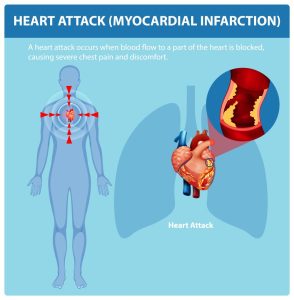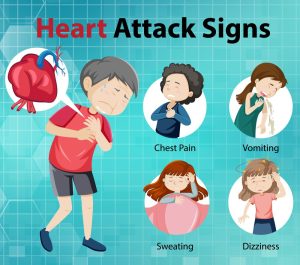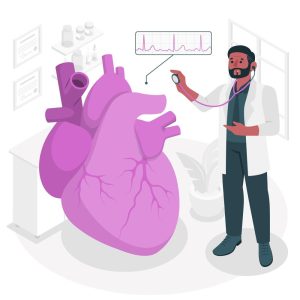Understanding Heart Attacks
Heart attacks, also known as myocardial infarctions, are a leading cause of death globally. During a heart attack, blood flow to a part of the heart is blocked, mainly by a blood clot, causing damage or death of heart muscle tissue. Prompt medical attention is vital to restore blood flow and minimize heart damage.

Common Symptoms of a Heart Attack
While chest pain is the hallmark symptom, heart attacks can present with a variety of signs:
- Chest Discomfort: A sensation of pressure, tightness, or squeezing in the center of the chest.
- Upper Body Pain: Discomfort may radiate to the shoulders, arms, back, neck, or jaw.
- Shortness of Breath: It happens with chest discomfort but can occur independently.
- Other Signs: Cold sweat, nausea, lightheadedness, or sudden dizziness.
Silent Heart Attacks
As the name implies, a silent heart attack doesn’t show any classic symptoms of a heart attack. For this reason, they can be readily overlooked.
- Mild Discomfort: Subtle pain in the chest, back, or arms.
- Fatigue: Unexplained tiredness or weakness.
- Indigestion: Feelings resembling heartburn or stomach upset.
The symptoms mentioned above are often confused with less serious conditions, which can delay important treatment.

Gender Differences in Symptoms
Men and women may experience heart attacks differently:
- Men: More likely to report classic chest pain.
- Women: May experience atypical symptoms such as:
- Back or Jaw Pain: Discomfort in the upper back or jaw.
- Nausea or Vomiting: Often mistaken for gastrointestinal issues.
- Shortness of Breath: Occurs without chest pain.
- Fatigue: Unusual tiredness or sleep disturbances.
These heart attack symptoms in women can lead to misdiagnosis or delayed heart treatment.
Back Pain and Heart Attacks
Is back pain a symptom of a heart attack? Yes, particularly in women. The pain may feel like pressure or tightness in the upper back and can be mistaken for muscle strain. If back pain is accompanied by other symptoms, such as shortness of breath or nausea, seek immediate medical attention.
Mild Heart Attack Symptoms
Not all heart attacks present with severe symptoms. Mild heart attacks may involve:
- Discomfort: Mild chest pain or pressure.
- Fatigue: Unusual tiredness without exertion.
- Shortness of Breath: Even during rest.
Pre-Warning Symptoms
Some individuals experience warning signs days or weeks before a heart attack:
- Chest Discomfort: Recurring pain or pressure.
- Fatigue: Constant tiredness without a clear cause.
- Sleep Disturbances: Difficulty sleeping or waking feeling unrefreshed.
Recognizing and addressing these symptoms early can prevent a full-blown heart attack.
When to Seek Medical Help
Seek fast medical attention if you experience:
- Chest Pain: Lasting more than a few minutes or recurring.
- Shortness of Breath: Especially if sudden or unexplained.
- Fainting or Dizziness: Accompanied by other symptoms.
Prompt treatment can save lives and reduce heart damage.

FAQ’s
1. Can a heart attack occur without any noticeable symptoms?
Yes, this is known as a silent heart attack. Individuals may not experience classic symptoms like chest pain. Instead, they might feel mild discomfort, fatigue, or shortness of breath. Silent heart attacks are more common in older adults and those with diabetes. Regular check-ups and monitoring are essential for early detection.
2. Are heart attack symptoms different between men and women?
Yes, while both genders can experience chest pain, women are more likely to have atypical symptoms such as:
- Back or jaw pain
- Shortness of breath
- Nausea or vomiting
- Extreme fatigue
These differences can lead to misdiagnosis or delayed treatment in women.
3. Is back pain a symptom of a heart attack?
Yes, back pain, especially in the upper back, can be a symptom of a heart attack, particularly in women. It may be accompanied by other signs like shortness of breath or nausea. If you experience unexplained back pain along with other symptoms, seek medical attention promptly.
4. What are the early warning signs of a heart attack?
Early warning signs can include:
- Chest discomfort or pressure
- Shortness of breath
- Fatigue
- Lightheadedness
These symptoms may occur days or weeks before a heart attack. Recognizing and addressing them early can prevent a more severe event.
5. Can mild heart attack symptoms be overlooked?
Yes. Mild heart attack symptoms might be mistaken for indigestion, stress, or fatigue. Even if symptoms are subtle, they can indicate significant heart issues. It’s crucial to consult a healthcare professional if you experience any unusual or persistent symptoms.

